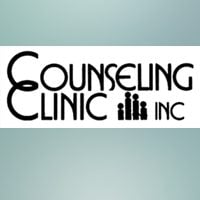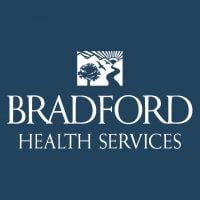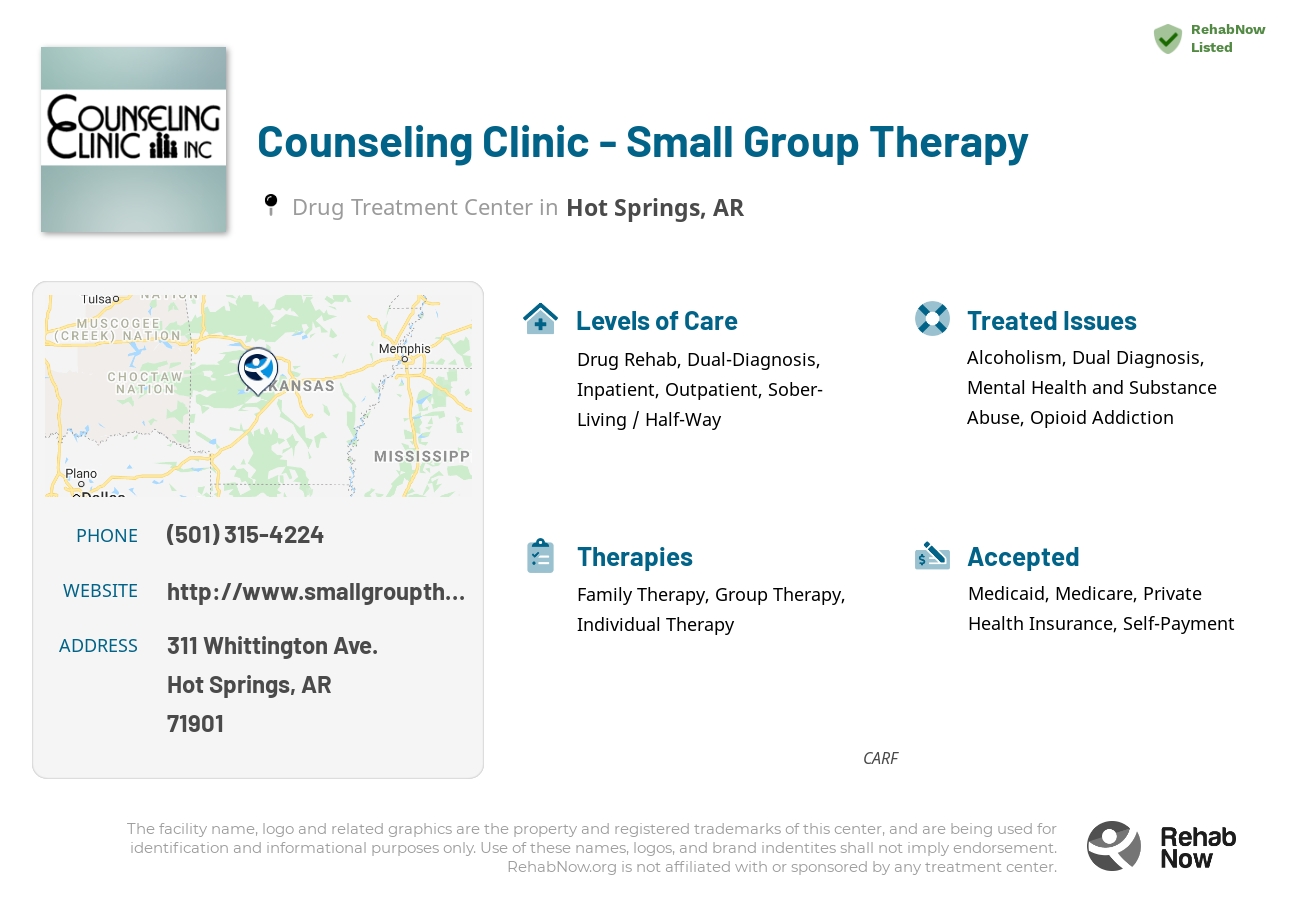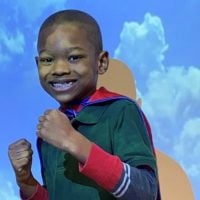
Counseling Clinic - Small Group Therapy
Drug Rehab Center in Hot Springs, Arkansas
- Opioid Addiction
- Dual Diagnosis
- Drug Addiction
- Alcoholism
Counseling Clinic - Small Group Therapy in Hot Springs, Arkansas offers individualized aid and a variety of therapeutic approaches for clients with mental health and substance abuse issues, providing comprehensive treatment plans that emphasize awareness-building and personal growth.
About This Arkansas Facility
Located in Hot Springs, Arkansas, Counseling Clinic - Whittington Avenue stands out for its outpatient services tailored for individuals grappling with mental health diagnoses or substance addiction. It blends individual counseling, case management, and social skills development to address addiction comprehensively. The clinic inherits the pioneering spirit of the Fairweather Program, emphasizing autonomy alongside supportive social systems.
Counseling Clinic - Whittington Avenue is accredited by CARF and SAMHSA, ensuring a high standard of care and professional approach in treating substance addiction and mental health concerns. This clinic employs a unique blend of individualized aid, combining evidence-based treatment methods and traditional therapeutic approaches to foster recovery and personal growth.
- Tailors individual and group therapies to meet the specific needs of its clients, creating a personalised recovery path.
- Licensed by the Arkansas Department of Health and accredited by national bodies, underlining its commitment to quality and professional standards.
- Offers a comprehensive approach to addiction recovery, including relapse prevention and techniques to manage cravings effectively.
Counseling Clinic - Whittington Avenue addresses a wide range of addictions and behavioral issues, employing evidence-based methods like trauma-focused cognitive behavioral therapy and dialectical behavior therapy. Clients can access various levels of care, from intense individual therapy to supportive group settings, designed to promote lasting sobriety and mental well-being.
Genders
Ages
Modality
Additional
Accreditations
SAMHSA

CARF
The Commission on Accreditation of Rehabilitation Facilities (CARF) is a non-profit organization that specifically accredits rehab organizations. Founded in 1966, CARF's, mission is to help service providers like rehab facilities maintain high standards of care.
Conditions and Issues Treated
Opioid abuse has become a national epidemic in the last decade. The US has one of the world’s highest rates of opioid use and abuse, as well as opioid-related deaths. Opioids are classified as Schedule II-IV controlled substances in the US due to their high potential for abuse.
Oxycodone, hydrocodone, methadone, and fentanyl are the most common Opioids and are commonly prescribed to treat pain. Tolerance to opioids develops over time, making life difficult, if not impossible, without them. Opioid users often obtain the drugs illegally. They can be drug dealers, friends, or family members who do not have valid prescriptions.
The desire for a more intense high than prescription opioids can quickly lead to heroin use. Heroin users are more prone to illness and death due to the high risk of overdose.
Many opioid addicts who seek treatment believe that the only way to overcome their addiction is through medical detox and long-term drug addiction rehab. To help patients wean off their addiction and reduce the risk of overdose, medication-assisted therapy (MAT) involves prescribing a replacement opioid. Doctors use MAT in conjunction with other anti-craving medications to help patients maintain recovery. Due to the high risk of relapse, MAT is often combined with individual and group counseling and social support programs.
When addiction and psychiatric issues co-occur, the addict’s recovery is more successful when both conditions are treated. A dual diagnosis refers to a condition in which the patient is diagnosed with two health issues: addiction and bipolar disorder. The most common therapies are psychotherapy, behavioral therapy, spiritual counseling, 12-step programs, and medication management.
Levels of Care Offered at Counseling Clinic - Small Group Therapy
This center offers a variety of custom treatment tailored to individual recovery. Currently available are Drug Rehab, Dual-Diagnosis, Inpatient, Outpatient, Residential, Sober-Living / Half-Way, with additional therapies available as listed below.
Inpatient treatment centers offer a safe, secure, and often medically supervised environment for drug or alcohol-addicted individuals. Many of these facilities are equipped to provide detoxification, treatment for co-occurring mental health disorders, and aftercare programs. The patient typically spends 28 to 30 days at the facility and will receive extensive drug counseling.
An outpatient treatment program is set up to help with alcohol or drug addiction or a co-occurring disorder. The patient must attend the facility for their therapy and other programs but can return home each night.
The frequency of mandatory attendance decreases after much of Counseling Clinic - Small Group Therapy‘s program is complete.
Outpatient treatment is a recovery approach that allows recovering addicts to live at home while getting rehab for addiction
An outpatient can include day treatments which include attending group sessions one hour per week. A person living in an outpatient environment may be allowed the opportunity to work full time if they choose to and continue studies without interruption from drugs/alcohol.
Outpatient treatment is an option for people who want to maintain their careers and families. Outpatients live at home but attend treatment such as individual counseling, group counseling, or twelve-step meetings during the day.
Sober Living Homes are used in drug rehab to help former addicts maintain sobriety. The residents are provided with a safe and supportive environment to learn how to live a sober life. They also provide them with opportunities for exercise, many of which encourage learning coping mechanisms that will be helpful later on.
Residential treatment programs are those that offer housing and meals in addition to substance abuse treatment. Rehab facilities that offer residential treatment allow patients to focus solely on recovery, in an environment totally separate from their lives. Some rehab centers specialize in short-term residential treatment (a few days to a week or two), while others solely provide treatment on a long-term basis (several weeks to months). Some offer both, and tailor treatment to the patient’s individual requirements.
Therapies & Programs
At Counseling Clinic - Small Group Therapy , to learn from past mistakes and improve one’s situation, the recovering person meets individually with a therapist. The counselor or therapist will address addiction causes, triggers, mental issues, dual diagnosis, and aftercare plans during this time. This is a very intense and challenging process. Some clients find it easier to open up to someone other than family or friends who understand their struggles with addiction.
Family therapy is a crucial part of drug treatment and getting sober. It is one of the most effective ways to help addicts stay on the path to long-term sobriety. An addict’s family can play a vital part in helping them to avoid relapse. They can spot the warning signs and help them get back on track.
In group therapy, recovering addicts meet with a therapist and other people in recovery. Some groups are closed, meaning only people who share the same addiction or problem can attend. Others are open to anyone who wants to stop using drugs or drinking alcohol. Group therapy sessions typically focus on one topic each week or month so that recovering addicts can discuss issues they face daily.
Payment Options Accepted
For specific insurance or payment methods please contact us.
Is your insurance accepted?
Ask an expert, call (888) 674-0062
Counseling Clinic Associated Centers
Discover treatment facilities under the same provider.
- Counseling Clinic - Youth Services in Benton, AR
- Counseling Clinic - Outpatient Services in Benton, AR
Learn More About Counseling Clinic Centers
Additional Details
Specifics, location, and helpful extra information.
Hot Springs, Arkansas 71901 Phone Number(501) 315-4224 Meta DetailsUpdated April 15, 2024
Staff Verified
Patient Reviews
There are no reviews yet. Be the first one to write one.
Hot Springs, Arkansas Addiction Information
Arkansas has one of the highest rates of substance abuse and addiction in the nation for drug overdoses. Methamphetamines and prescription opioids are by far the most widely abused drugs in the state. Despite the high rates, Arkansas ranked only 25th in the for drug overdose deaths in 2013.
The drug addiction problem in Hot Springs, Arkansas, is relatively bad. According to recent statistics, over 1,000 admissions to treatment centers for drug and alcohol abuse in Hot Springs in 2016. This means that approximately 2.8% of the population of Hot Springs sought treatment for addiction in 2016. Additionally, there were 8 fatalities due to drug overdoses in Hot Springs in 2016.
Treatment in Nearby Cities
- Benton, AR (27.1 mi.)
- Fordyce, AR (61.1 mi.)
- Harrison, AR (118.6 mi.)
- Booneville, AR (65.2 mi.)
- Salem, AR (146.0 mi.)
Centers near Counseling Clinic - Small Group Therapy



The facility name, logo and brand are the property and registered trademarks of Counseling Clinic - Small Group Therapy, and are being used for identification and informational purposes only. Use of these names, logos and brands shall not imply endorsement. RehabNow.org is not affiliated with or sponsored by Counseling Clinic - Small Group Therapy.







